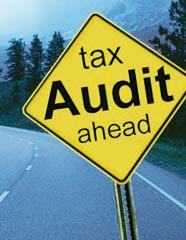Part 2 - Documents, Documents, Documents
Florida sale tax auditors love documents. One of the first things presented to the taxpayer during a Florida sales tax audit is a list of documents they wish to have available for inspection. Usually this list breaks down to everything that has ever had anything to do with your business as well as “other documents as needed”. The department seems to think that everything should be made available and then the auditor will be the judge of whether it is relevant to the audit process. I feel that a lot of times this leads to fishing expeditions where the auditor acts as the sole judge, jury, and executioner of what is relevant and what is taxable.
In a lot of instances if all the documents are not available, or do not exist, you will then get a series of letters, each more intimidating than the last, demanding that all of the documents be made available at one time. Auditors state this is so the audit can be done in an efficient manner. They won’t tell you that they are only allotted a certain number of man hours per audit and that management uses this in their evaluations. I am all for the audit being completed in an efficient manner and actually see my job as working with auditors in getting audits complete and bringing taxpayers into compliance in a timely manner. The difference is I believe in doing it while protecting the taxpayer’s rights and trying to minimizing any possible pain. I believe the main objective of any audit is that it be fair and reasonable first and then worry about the efficiency of the auditor second.
The main focus of an audit is to confirm the accuracy of your records and then identify that tax is being charged, collected, and possibly remitted correctly in accordance with the Florida statutes. Accuracy is usually determined by comparing your records with reliable third party documents. The most common third party documents used are federal tax returns (usually a good source documents), or bank statement (usually not such a good source document). They also have access to other state agencies records. That means they can get car sales as reported to the DMV, alcohol sales and purchases as reported to the ABT, or reports from any other state agencies. They also can request a copy of your federal returns from the IRS, but probably won’t tell you they have done so because of “confidentiality”.
They will want to investigate transactions from four main areas of your business, Sales, Expenses, Fixed Assets, and Commercial Rental (which sums up pretty much everything in your business).
Sales – They are looking to make sure that all of your sales are reported. That all of your exempt sales are exempt by statute and you have the proper documentation for each transaction on hand. That your taxable sales are all reported and taxed correctly.
Expenses – They are looking at your cost of goods sold and your general expenses to make sure that tax was charged correctly. The most common areas of risk found are for out of state suppliers, commercial cleaning, pest control, as well as many others. The many other areas of risk depend upon the industry and if any of your suppliers are not charging you correctly you can and probably will be assessed for their errors.
Fixed Assets – All of your fixed assets purchased during the audit period will be examined and any transaction found not to be taxed correctly will be picked up for assessment. The most common areas of concern are purchases from out of state, the internet, and undocumented general ledger adjustments.
Commercial Rental – Florida is the only state that taxes commercial rentals. This catches a lot of people from out of state unaware of their obligations. Also, any payment made by a tenant that is of benefit to the landlord is also considered taxable. This includes property taxes, insurance, and any many other payments. These assessments take many taxpayers by complete surprise.
The Florida Sales tax auditor will want to examine these transaction either in detail (rare unless you are small or have gotten an auditor with an axe to grind) or by picking a sample. They are supposed to pick the sample so that it is appropriate for the taxpayer being audited. However, most will use the department’s random sample generator to pick the sample. I believe they do this so they cannot be accused of some kind of bias, and many times they will have samples picked before they have even began the audit or examined a record. This cookie cutter approach is where audits become inefficient in my opinion. The auditor will normally ask you to sign an agreement to the use of the sample before they have done any work. I strongly encourage you not to sign anything from the department without making sure you know the consequences of your actions. Just because a sample is random does not mean it will give an accurate or fair view of the audit period. I have nothing against sampling and believe it is proper auditing tool when used correctly, but you should reserve the right to get and confirm and possibly modify the results of any sample before agreeing to anything in writing. A onetime error included in the sample period that is not repeated throughout the audit period can result in a large and unfair assessment.
If you have electronic records the department will request access to your entire electronic records. In the case of QuickBooks and some other accounting software they will ask for a backup of your entire system. I strongly suggest you do not give them a backup of or unlimited access to your system. This will contain data that is well outside the scope of the audit and they have no need to see. They will tell you they have the have the strictest confidentiality policy, but in the end they are people and it is your property not the governments. They have no right or need for all of this data. I believe giving easy access to this level of data can also lead to sloppy and lazy auditing that can lead to unfair assessments and time consuming audits. I have seen auditors upload all of the transactions from a segment of electronic data directly into their auditing software and then tell the taxpayer they will all be assessed on each transaction and will only remove each transaction once it has been proven to be taxed correctly with all of the proper documentation required. I don’t believe this is proper auditing. I consider it bullying and usually results in an inefficient audit that leads to protest, unless of course the taxpayer caves and pays to make it go away, which regrettably I understand becomes a necessary business decision in a lot of cases.
If you do not provide “adequate” records the auditor at their “discretion” can determine your records to be “inadequate” and “estimate” an assessment based on “best information available”. Most auditors are very careful and work hard to try and come up at least some reasonable basis for any estimate. However, I have seen auditors take this to the extreme and push to maximize the assessment with no thought on being reasonable. I have even had auditors when questioned on how they came up with their estimate say “best information available” and refuse to say anything further and provide no documentation. In my mind this means “I made it up”. I don’t consider this to be fair, reasonable, or professional and I wish I could say it never happens, but I can’t.
I hope this gives an overview of a Florida sales tax audit and the documents and procedures used. Each audit is unique as is each taxpayer and the rules and statutes for Florida sales tax are so complex, it would be impossible to cover all possibilities in any one article. If you have any questions feel free to contact me at stevemiddel@floridasalestax.com or (813) 756-2432.
After the auditor completes their examination of the documents they will issue a DR-1215, Notice of Intent to Make Audit Changes, this document will have the amount of tax, interest and penalty that the department says is owed. I will discuss this document and the completion of the audit in the next and last article in the series.
Moffa, Sutton, & Donnini, PA is a law firm with more than 90% of its practice dedicated to defending Florida Businesses against the Florida Department of Revenue in Florida sales and use tax matters. With 10 attorneys and 4 former Department of Revenue agents on staff, we are here to answer your questions and help fight back. We offer free initial consultations, so why not call the number at the top of this page now!
 Steven C. Middel is a senior auditor who joined the Law Offices of Moffa, Sutton, & Donnini, P.A. in 2015. Mr. Middel concentrates in the following areas of Florida sales and use tax: Audit, protest, collections, and criminal defense. Mr. Middel joined the firm after spending almost 5 years as a multi tax auditor for the Florida Department of Revenue. Before joining the firm, Mr. Middel has worked in many fields and has held many positions including computerized accounting system creation and consulting, commercial services, construction, financial services, retail sales, and most recently with the federal and state government. He has held a wide variety of titles including; consultant, comptroller, CFO, COO, president, loan officer, sales manager and of course auditor.
Steven C. Middel is a senior auditor who joined the Law Offices of Moffa, Sutton, & Donnini, P.A. in 2015. Mr. Middel concentrates in the following areas of Florida sales and use tax: Audit, protest, collections, and criminal defense. Mr. Middel joined the firm after spending almost 5 years as a multi tax auditor for the Florida Department of Revenue. Before joining the firm, Mr. Middel has worked in many fields and has held many positions including computerized accounting system creation and consulting, commercial services, construction, financial services, retail sales, and most recently with the federal and state government. He has held a wide variety of titles including; consultant, comptroller, CFO, COO, president, loan officer, sales manager and of course auditor.
Read Part 1 of the article series HERE.
ADDITIONAL RESOURCES
What Services Are Subject to Sales Tax in Florida?, published May 1, 2012, by James Sutton, CPA, Esq.
Is Rent Subject to Florida Sales Tax?, published January 26, 2015, by Jerry, Donnini, Esq.
FL DOR Abuses Convenience Store Industry, published October 4, 2015, by James Sutton, CPA, Esq.
FL Reemployment Tax Audit: Independent Contractor vs Employee, published August 23, 2015, by James Sutton, CPA, Esq. & Paula Savchenko

